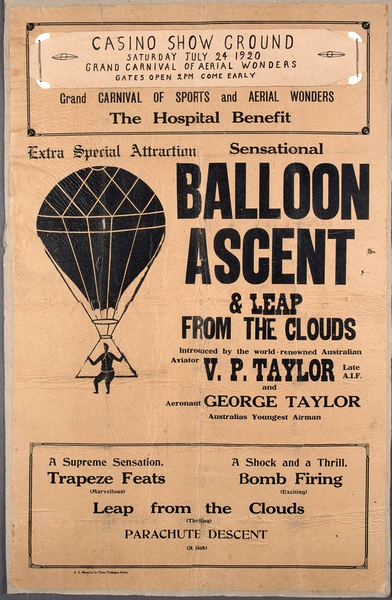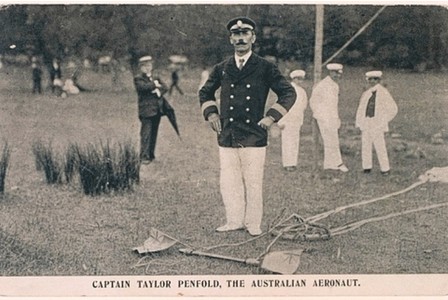[UPDATED - BROKEN LINK: Stuntman Santa got lucky when jump landed him in Chelmsford field]
At first glance you may well wonder why such a headline as the one above is appearing on a vintage blog like this and I wouldn't blame you. I think I can speak for most areas of the country (and maybe even the world) when I say that those who write for local newspapers tend not to display the same journalistic talents as your average
Telegraph or
Times reporter(!).
This particular local story then, which caught my eye despite its editorial shortcomings, hasn't taken place in the present but rather one hundred years in the past. However elements of the incident have a certain modernity about them and the main protagonist could be said to be something of a pioneer - how often now do we hear of people parachuting or doing some other daredevil activity for a charity or promotion and think nothing of it?
But in 1912, when manned flight was still very much a talking point and parachutes in their infancy, adventurers and thrillseekers throwing themselves out of balloons (and aeroplanes) was quite the novelty. We may think of base-jumping and skydiving as fairly modern activities but in truth very similar attempts were being made a century ago. One such trailblazer is the subject of this article - Australian balloonist Victor Patrick Taylor.
Hailing from Sydney Victor Taylor, fascinated as many were by early attempts at flight and particularly lighter-than-air craft, discovered the art of parachute jumping while working in America in 1906. Pretending to be an already-established Australian parachutist (using the name "Captain Penfold", which would remain his professional soubriquet for most of his subsequent career) he befriended a local San Franciscan specialist and - despite never having actually jumped before in his life - quickly learned how. He spent the next two years in San Francisco, heavily involved in light-than-air travel (culminating in he and a friend dropping firecrackers from an airship on to the US Fleet moored in San Francisco Bay!), before he returned to Australia in 1908 to start a career in ballooning and parachuting. There he undertook many balloon flights across the Australian Bush and, in an early example of fundraising, was sponsored by local government and businesses to the tune of £25 a day (with 33% going to local hospitals) to do balloon ascents and parachute jumps - the latter often dangling precariously from a trapeze mounted outside the basket.
In 1912 Taylor travelled to England and became the 376th person to obtain a pilot's licence and Royal Aero Club certificate. It was shortly after this achievement that he was approached to perform the jump featured in this article. As a publicity stunt
Sandow's Chocolates requested that he jump out of a balloon over Hyde Park in London dressed as Father Christmas and hand out bars of their chocolate to any children present. As the accompanying account tells the weather had other ideas and Taylor, the balloonist
& co-owner Frank Spencer
(Ed. to UK readers - I know!) and Gaumont cameraman (and later polar explorer)
Hubert Wilkins were caught out by the winds and found themselves speeding over the outskirts of Chelmsford, Essex - 35 miles from London - almost before they knew it.
 |
| Taylor, in his Santa costume, prepares for take-off in Hyde Park |
As you can read Taylor, anxious to get down, jumped out when a hole in the clouds showed them to be over open country and although his parachute opened properly he still managed to hit his head on landing, momentarily knocking himself out! When he came to he found himself surrounded by curious locals and their children. Quite what they made of the whole business I can scarcely imagine! Not to be defeated Taylor gathered himself together and promptly handed the sweets out to the Chelmsford children instead!
After this partial success Taylor went on to become possibly the first person to perform what we now term a BASE jump in Australia, parachuting 150ft off a Sydney bridge in 1914. During the Great War he served in the Australian artillery, being wounded and invalided out the Army in 1917 with shell shock. In 1918 he returned to America where he continued his aeronautical exploits for another twelve years. He died in 1930, aged 56, from digestive illness the causes of which were never determined.
I was delighted to discover the history of this eccentric chap, who billed himself as "the Australian Aeronaut", and hope you have enjoyed it too. It is good to see that his exploits have not been totally forgotten, particularly his link with my county town - not 15 miles away - which involved as it did a remarkable festive aerial adventure that took place almost exactly 100 years ago.









I love that top photograph, it has a beautiful dream like quality to it.
ReplyDeleteYes, it is beautiful isn't it? It's an Autochrome (early colour photograph) of the 1909 Paris Air Show from one of my Pinterest boards. A good illustration of the type of balloons Captain Penfold would have used, I thought.
DeleteMerry Christmas!
ReplyDelete